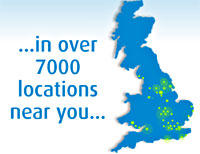 UK regulator Ofcom is looking at plans to introduce high speed Internet access to broadband-starved remote areas by boosting the power of Wi-Fi signals.
UK regulator Ofcom is looking at plans to introduce high speed Internet access to broadband-starved remote areas by boosting the power of Wi-Fi signals.
Talking to the BBC, James Saunders, chief marketing honcho of Wi-Fi suppliers, The Cloud, welcomed consultation from Ofcom, adding that the turbo-charged Wi-Fi could, “provide great opportunities in rural areas that are currently without broadband. It makes it much more possible to put up a wireless network.”
Current limitations on the strength of Wi-Fi signals in the UK makes it prohibitively expensive to provide coverage to sparsely populated rural areas, but cranking up the power would make it possible to reach far more users without breaking the bank.
The bigwigs and boffins at Ofcom are currently mulling over the pros and cons of three proposals.
The first would see wireless signals (which are restricted to a tenth of the power permitted in the US) in all parts of the UK; the second would see the power increase limited to rural areas only; while the third option would include a balance of the first two plans, backed by a code of collaboration to minimise signal interference.
 City networks
City networks
Although most UK towns and cities offer outside Wi-Fi access through hotspots in cafes, pubs and libraries, city-wide seamless networks are yet to be established.
Known as mesh networks, these let Wi-Fi’d folks roam freely from hotspot to hotspot without any interruption to their Internet access.
Although such networks are already starting to roll out in the US, the restricted Wi-Fi transmission levels in the UK mean that mesh networks would currently be prohibitively expensive in the UK.
Selina Lo, chief executive of home Wi-Fi antenna firm Ruckus explained, “With lower power you have to use a lot more access points to form the network.”
“A typical network will have hundreds or low thousands of access points. If you have power limits, these nodes have to be closer together and you need a lot more nodes,” she added
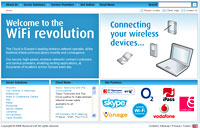 Ruckus, who are currently working with Google to test a free mesh network in Mountain View, California, have developed a new Wi-Fi antenna to help home users connect to city networks.
Ruckus, who are currently working with Google to test a free mesh network in Mountain View, California, have developed a new Wi-Fi antenna to help home users connect to city networks.
“People running city networks know that the Wi-Fi in customers’ home equipment is not powerful enough to do an outdoor long range connection….our device is designed to bridge that connection,” said Ms Lo.
Interference
Although boosting Wi-Fi signals looks to be a top notch idea, it’s not without its drawbacks in urban areas, where US hotspot operators are already experiencing “significant” interference between suppliers.
Despite this, Saunders said The Cloud was committed to making mesh networks happen in the UK in the future, but warned that, “a number of factors are needed to make mesh networks economical”.
The company is, however, already working with the Corporation of London to deploy a mesh network in the City.
 As of today BT is reshuffling its phone pricing structure. In a typical move of a power-crazed ex-monopoly, it’s giving with one hand and taking away with another.
As of today BT is reshuffling its phone pricing structure. In a typical move of a power-crazed ex-monopoly, it’s giving with one hand and taking away with another.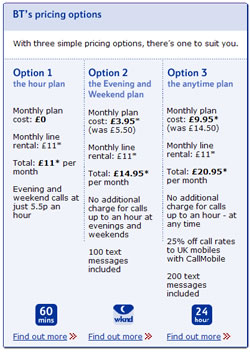 The ‘taking’
The ‘taking’ Well they got there finally, Vodafone UK have announced that they’re releasing the less than catchy named Vodafone Mobile Connect USB Modem in the Autumn. It will support their 3G data service and, surprise, surprise, connect to computers using a USB lead. Rather neatly the software disks aren’t needed, as they’re installed directly from the modem.
Well they got there finally, Vodafone UK have announced that they’re releasing the less than catchy named Vodafone Mobile Connect USB Modem in the Autumn. It will support their 3G data service and, surprise, surprise, connect to computers using a USB lead. Rather neatly the software disks aren’t needed, as they’re installed directly from the modem. BSkyB results for the last year were broadly in line with predictions, but seasoned watchers of all things financial, recognise tell-tale signs of a flattening of the growth curve. The company has managed its spend on programming well, but technology costs remain high, with significant outgoings on expensive High Definition equipment, that won’t bring instant revenue returns.
BSkyB results for the last year were broadly in line with predictions, but seasoned watchers of all things financial, recognise tell-tale signs of a flattening of the growth curve. The company has managed its spend on programming well, but technology costs remain high, with significant outgoings on expensive High Definition equipment, that won’t bring instant revenue returns. James Murdoch the CEO of BSkyB told the corporate world that “Our industry is changing faster than ever before and for Sky, 2006 has been an important and exciting year.”
James Murdoch the CEO of BSkyB told the corporate world that “Our industry is changing faster than ever before and for Sky, 2006 has been an important and exciting year.” Steve Case, co-founder of AOL, now ex-chairman of AOL-Time Warner, has said he was sorry for the merger between AOL and Time Warner. It is widely regarded as a deal that didn’t go very well, leading to internal wrangling and huge amounts of money being knocked of share values.
Steve Case, co-founder of AOL, now ex-chairman of AOL-Time Warner, has said he was sorry for the merger between AOL and Time Warner. It is widely regarded as a deal that didn’t go very well, leading to internal wrangling and huge amounts of money being knocked of share values. When pushed, Case said from the point of shareholders of the two companies, employees & customers – it didn’t go as he’d hoped, it had been a disappointment and a source for frustration. Given the wide range of those included by Case, we don’t know who else might be disappointed who wasn’t included.
When pushed, Case said from the point of shareholders of the two companies, employees & customers – it didn’t go as he’d hoped, it had been a disappointment and a source for frustration. Given the wide range of those included by Case, we don’t know who else might be disappointed who wasn’t included. Yesterday saw the press unveiling of Sky Broadband, showing the eventual absorption of EasyNet, the UK ISP that they
Yesterday saw the press unveiling of Sky Broadband, showing the eventual absorption of EasyNet, the UK ISP that they  Sky marketing have been taking their now-expected simplistic approach to the name of the product, with Base, Mid and Max. It’s genius like this that produced the name Sky+, the name that sold 100k+ PVRs to the UK public, when previously they didn’t understand what the hell it was.
Sky marketing have been taking their now-expected simplistic approach to the name of the product, with Base, Mid and Max. It’s genius like this that produced the name Sky+, the name that sold 100k+ PVRs to the UK public, when previously they didn’t understand what the hell it was. Since James Murdoch took over running Sky, its stated ambition has been 10 million subscribers by 2010, but as we get closer to that, it’s getting hard to convert over those naughty-non-subscribers.
Since James Murdoch took over running Sky, its stated ambition has been 10 million subscribers by 2010, but as we get closer to that, it’s getting hard to convert over those naughty-non-subscribers. As expected, Sky has released details of their new “free” broadband promotion, which offers their 2Mb Base package for nowt.
As expected, Sky has released details of their new “free” broadband promotion, which offers their 2Mb Base package for nowt. For users out of a Sky network area, there’s the pricey ‘Connect’ option which offers up to 8Mbs connectivity, 40GB usage cap, £40 activation fee and £50 home install for a distinctly upmarket £17 per month.
For users out of a Sky network area, there’s the pricey ‘Connect’ option which offers up to 8Mbs connectivity, 40GB usage cap, £40 activation fee and £50 home install for a distinctly upmarket £17 per month. 30 per cent of Sky customers on broadband
30 per cent of Sky customers on broadband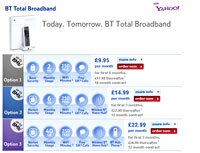 A new report has awarded the honours to BT, Virgin, Demon, AOL and Orange as being the UK’s top five consumer ADSL broadband services throughout the second quarter of 2006.
A new report has awarded the honours to BT, Virgin, Demon, AOL and Orange as being the UK’s top five consumer ADSL broadband services throughout the second quarter of 2006. Gavin Johns, Managing Director of Epitiro said, “Our consumer ADSL testing found that in terms of Internet performance, BT topped the overall rankings for the period April to June 2006. BT was also found to provide the fastest service as a percentage of its theoretical maximum.”
Gavin Johns, Managing Director of Epitiro said, “Our consumer ADSL testing found that in terms of Internet performance, BT topped the overall rankings for the period April to June 2006. BT was also found to provide the fastest service as a percentage of its theoretical maximum.”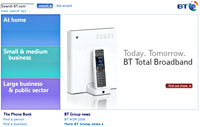 1 BT 2.78
1 BT 2.78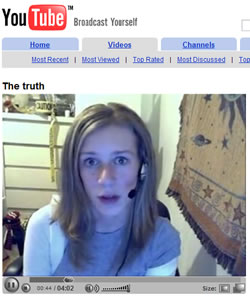 OK, you’re used to us breaking news here, but here’s one that slipped through without us noticing. We think it’s sufficiently important for us to swallow our pride and report it anyway.
OK, you’re used to us breaking news here, but here’s one that slipped through without us noticing. We think it’s sufficiently important for us to swallow our pride and report it anyway. When it comes to World Cup football Web coverage in the UK, the BBC isn’t just dribbling past its rivals – it’s positively crushing past them, according to figures released by Nielsen NetRatings.
When it comes to World Cup football Web coverage in the UK, the BBC isn’t just dribbling past its rivals – it’s positively crushing past them, according to figures released by Nielsen NetRatings. Interestingly, the Sporting Life site proved the ‘stickiest’ with punters spending the longest time on the site (an average of 36 mins each).
Interestingly, the Sporting Life site proved the ‘stickiest’ with punters spending the longest time on the site (an average of 36 mins each).